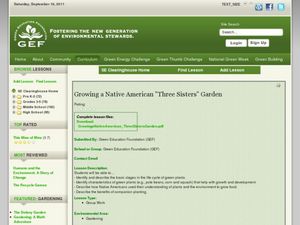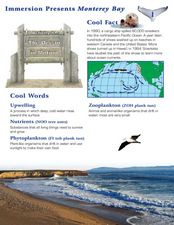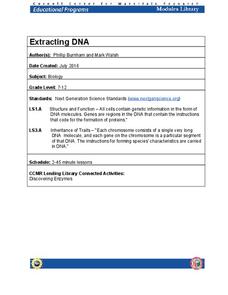Curated OER
Habitat for Plants! There's No Place Like Home!
Students compare and contrast conditions necessary for survival of aquatic and terrestrial plants, identify common and scientific names of plants,
and determine correlation between location and plant characteristics. Students then use...
Curated OER
Plant Identification: New Jersey vs. Ecuador
Sixth graders discover the different plants that grow in different climates through specimen collections. In this botany lesson, 6th graders examine plants from both New Jersey and Ecuador and discuss what conditions could create such...
Scholastic
Study Jams! Mosses and Ferns
Mosses and ferns are some of the world's oldest types of plants. Here is a quality 10-slide presentation set to gentle background music for beginning botanists to view and enjoy. Accompanying captions explain that these are both...
Curated OER
Those Particular Plants in Particular Regions
Fourth graders, acting as a botanist, analyze information on different plants in different regions of California. They characterize each plant for each region and answer a variety of question for each plant while doing this study.
University of Wisconsin
Infiltration Test: Exploring the Flow of Water Through Soils
Soil scientists gain experience with an infiltrometer can to determine the infiltration rates at different locations on campus. If you are using the entire unit, the class has already analyzed water flow and soil types, so they should...
Curated OER
Carbon 14 Dating, Variation 2
Your archaeologists begin this task with a table of values to estimate the time passed based on the half-life of Carbon 14 remaining in a plant. They then move on to find when a specific amount of Carbon 14 is present in the same plant,...
Curated OER
Stream Scanners
Students investigate quality of water in a stream, lake, or pond by examining chemical, physical, and biological characteristics.
Curated OER
Kingdom: Fungi
The general characteristics that affect classification of fungi and other organisms in the domain Eukarya are detailed for the students on 12 attractive slides. Teachers can access individual slides to cover life cycles or diversity, or...
Curated OER
Habitat Assessment
Third graders demonstrate the effects of varying environmental components on plants and animals: chemical, physical and biological characteristics of a habitat. They find chemical, physical and biological characteristics of the lake at...
Curated OER
Evolution of Plants
This is a wonderful PowerPoint! It gives excellent details of different types of ferns and their characteristics which help them to survive and produce spores in many varied habitats.
Curated OER
What Lives in Water?
Students learn about a variety of sea creatures. They look at sea creatures pictures and identify the creatures by name and by their unique characteristics. Phonemic Awareness skills are reinforced using the beginning sounds of the...
Curated OER
Pumpkin Time
Students visit a pumpkin farm and discuss the characteristics of a pumpkin and how they grow. They create a class story about the trip to the farm with each student supplying a sequence for the story.
Curated OER
Environmental Exchange Box
Students examine the characteristics of their own environment and compare them to another region. They prepare a box filled with items and stories about their own region, exchange the box with another class in another region, and...
Curated OER
Fifth Grade Science Assessment
In this science assessment worksheet, students complete a 25 question multiple choice quiz about biology. Plant and animal anatomy is included.
Curated OER
Growing a Native American "Three Sisters" Garden
Students explore plant life by creating their own gardens in class. In this food growing lesson plan, students discuss the types of gardening methods Native Americans used in order to keep healthy. Students plant corn seeds in their...
Curated OER
Name That Leaf
Take a walk through nature with a science experiment about leaves. Third graders use a branching diagram to group attributes of certain kinds of leaves, such as oak, pine, and chestnut. For extra practice, they can collect leaves and...
Soft Schools
Interpreting Metaphors in Shakespeare
"All the world's a stage, and all the men and women merely players." Shakespeare provides the examples on this activity that asks readers to identify the two things being compared and to explain the characteristics the two share.
American Museum of Natural History
Extreme Mammals
Extreme characteristics can create some unusual mammals. Learners flip through a slide show of some of the most interesting mammals that are both living and extinct. Implement as a remote learning resource or use in-class to review...
Curated OER
Monterey Bay
Students read background information about Monterey Bay, California, and conduct related experiments. In this ocean in motion lesson, students read information about the location, wildlife, and characteristics of Monterey Bay. They...
Curated OER
Fungi
Lovely pictures help to summarize the different characteristics of fungi in this PowerPoint which covers structure, function and the way that fungi get nutrients. Symbiotic relationships are examined, and some commercial uses are given.
Curated OER
Kingdom: Fungi
The general characteristics of fungus types are presented here. Your class will love the pictures of the amazing features found on these strange living things. The internal and external structures and their functions are highlighted. By...
Curated OER
Fungi
The general characteristics that affect the classification of fungi and other organisms in the domain Eukarya are detailed on 12 attractive slides. Teachers can access individual slides to cover life cycles or diversity, or can use the...
Michigan State University
Friend or Foe?
What one person thinks is a pest may not be a pest to someone else. Here, scholars examine the characteristics of living things and pests through grand conversation and a variety of activities. Class members play a game of pest or not a...
Cornell University
Extracting DNA
Uncover the basics of DNA structure through exploration activities. Collaborative groups build DNA models and recreate the process of replication. Then, using plant cells such as peas or strawberries, they extract a DNA sample.
Other popular searches
- Edible Plant Characteristics
- Animal Plant Characteristics
- 3 Plant Characteristics
- Land Plant Characteristics
- Characteristics of Plant Cells
























